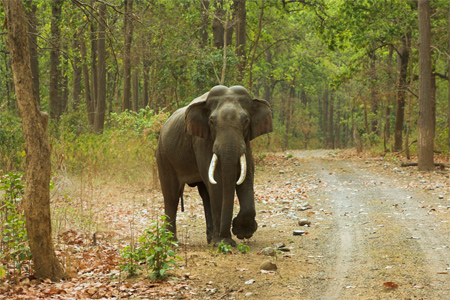Illegal wildlife trade debated at highest levels
Nairobi (Kenya), June 27, 2014: Security threats, organised crime and critical losses in biodiversity were the focus of a Ministerial Dialogue on Illegal Wildlife Trade at the inaugural meeting of the United Nations Environment Assembly (UNEA) in Nairobi.
As one of two NGO’s called upon to make a presentation at the session, IFAW (Wildlife Trust of India’s international partner) stressed the need to take advantage of the historic meeting to unite governments represented at UNEA in calling for and taking clear, far-reaching commitments to eradicate the unsustainable vice.
“While we are encouraged that wildlife crime is now being discussed at the highest political levels, we need to ensure that the commitments lead to positive changes on the ground,” said Peter Pueschel, IFAW Director of International Environmental Agreements.
“The world is facing a loss of its biodiversity. Wildlife, of which elephants are one of the most endangered face extinction due to poaching and the loss of their natural habitats. With an elephant killed about every 15 minutes for the illicit ivory trade, we may have lost another 12 elephants in the 3-hour session used to discuss this crisis,” stated Peter.

File photo: An Asian elephant in Rajaji National Park in North India.
Photo: Aniruddha Mookerjee / WTI
IFAW is calling on governments to commit the resources needed to reverse the spiraling decline of wildlife around the world by:
1. Increasing cooperation through National Environmental Security Task Forces (NESTs) as
recommended by INTERPOL.
2. Ensuring that anti-poaching and enforcement officers and regional enforcement networks have the resources and training they need to do their jobs effectively.
3. Enacting and enforcing punitive legislation in relation to wildlife crime
4. Supporting the International Consortium on Combating Wildlife Crime
5. Strengthening the LEAF Project and Project Wisdom run by INTERPOL and UNEP and using their services to identify and combat techniques used to launder illegal products
“I am hopeful that with wildlife crime so high on the global political agenda, the meetings will translate to tangible results on the ground that will stop the daily slaughter of elephants, rhinos and countless other animals. We expect all governments to support a strong resolution at the UNEA that reflects the stated clear, far-reaching commitments followed by effective compliance and enforcement action to eradicate illicit wildlife trade,” he added.
IFAW is working with governments, customs officers, and rangers on ground to protect wildlife from illegal trade. As part of a worldwide capacity building initiative IFAW is committed to see the end of illegal wildlife trade through training law enforcement officers in wildlife trafficking prevention in several countries throughout Africa, the Middle East, Asia, Oceania, and the Caribbean.
The UNEA is the new governing body of the United Nations Environmental Program. The special session on illegal wildlife trade was attended by approximately 160 countries, with almost 90 countries represented by Ministers of Environment.










